At 05:15 p.m on Thursday, 14 March 2016, at the media conference held in Mimara Museum, Steve Green, the president of the Commission of independent experts for the election of the Croatian European Capital of Culture for 2020, announced the Commission’s decision to award the title of European Capital of Culture to Rijeka. Rijeka won this prestigious title with the programme Port of Diversity, which aims to create a city of culture and creativity for Europe and the future. The Commission of independent experts elected Rijeka after visiting all four cities that entered the second round of the competition.
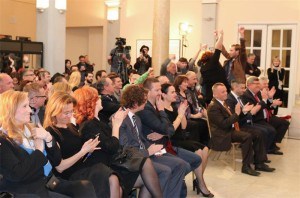 Steve Green, the president of the Commission of independent experts for the election of the Croatian European Capital of Culture 2020 from the European Commission, said that this decision was ?not rooted in heritage or history, but in plans for the future life of the city?. He stressed that Rijeka, like the other cities that entered the second round of the competition, met all the set criteria, but that the Commission’s evaluation of the proposed programmes was not based only on the programmes that these cities prepared for 2020, but also on all the things they are planning to realise in the years after they become European Capital of Culture.
Steve Green, the president of the Commission of independent experts for the election of the Croatian European Capital of Culture 2020 from the European Commission, said that this decision was ?not rooted in heritage or history, but in plans for the future life of the city?. He stressed that Rijeka, like the other cities that entered the second round of the competition, met all the set criteria, but that the Commission’s evaluation of the proposed programmes was not based only on the programmes that these cities prepared for 2020, but also on all the things they are planning to realise in the years after they become European Capital of Culture.
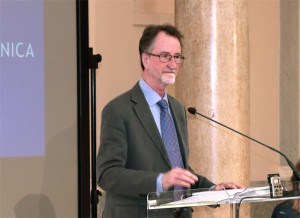 Steve Green expressed particular gratitude to the employees of the Croatian Ministry of Culture for their great dedication and professional approach to work and cooperation on the project, and congratulated the cities that entered the second round of competition, while stressing that ?all four cities worked hard to reach this point and, although it may appear as merely the effort of four teams, hundreds of people were involved in this work, including state officials, and this represented the key to success in all four cases?. The Commission reached their final decision on which of these cities could best relay the message of European solidarity after a final two-day presentation held in Zagreb on Wednesday and Thursday, at which the cities had the opportunity to individually appear before the Commission and hold a 45-minute presentation.
Steve Green expressed particular gratitude to the employees of the Croatian Ministry of Culture for their great dedication and professional approach to work and cooperation on the project, and congratulated the cities that entered the second round of competition, while stressing that ?all four cities worked hard to reach this point and, although it may appear as merely the effort of four teams, hundreds of people were involved in this work, including state officials, and this represented the key to success in all four cases?. The Commission reached their final decision on which of these cities could best relay the message of European solidarity after a final two-day presentation held in Zagreb on Wednesday and Thursday, at which the cities had the opportunity to individually appear before the Commission and hold a 45-minute presentation.
Dubrovnik presented itself with the programme City in the Making, which emphasises the components related to culture, Osijek with its application titled Oxygen, featuring a broad network of connections with neighbouring cities, while the programme presented by Pula, where the legacy of military history occupies one third of the city, was titled Demilitarise.
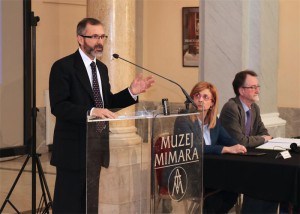 Michel Magnier, director of Culture and Creativity, also welcomed Croatia to the ?big family of European Capitals of Culture?, reminding that this initiative, which was established 30 years ago, has today developed into one of the most prominent cultural events in Europe that focuses on the promotion of intercultural dialogue and mutual understanding.
Michel Magnier, director of Culture and Creativity, also welcomed Croatia to the ?big family of European Capitals of Culture?, reminding that this initiative, which was established 30 years ago, has today developed into one of the most prominent cultural events in Europe that focuses on the promotion of intercultural dialogue and mutual understanding.
?The fundamental rule is for the selection procedure to be open, fair and just towards all the cities that participated, that all the rules have been adhered to and that the final decision is made on the grounds of a rigorous analysis of all of the projects that have applied? said Magnier, while stressing that ?selecting the winner was far from an easy task for the Commission?.
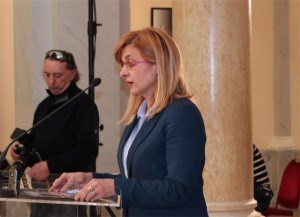 Ana Lederer, PhD, deputy minister of culture, addressed the audience in the name of the Ministry of Culture of the Republic of Croatia and congratulated all of the cities competing for the title of European Capital of Culture, particularly those that entered the second round of the competition – Dubrovnik, Osijek, Pula and Rijeka. The deputy minister of culture emphasised that ?Croatian cities recognise culture as a catalyst for changes and long-term investment into the betterment of society as a whole. They have realised the strength and power of creative processes, not only when it comes the local community, but also society in its entirety?.
Ana Lederer, PhD, deputy minister of culture, addressed the audience in the name of the Ministry of Culture of the Republic of Croatia and congratulated all of the cities competing for the title of European Capital of Culture, particularly those that entered the second round of the competition – Dubrovnik, Osijek, Pula and Rijeka. The deputy minister of culture emphasised that ?Croatian cities recognise culture as a catalyst for changes and long-term investment into the betterment of society as a whole. They have realised the strength and power of creative processes, not only when it comes the local community, but also society in its entirety?.
?A truly great amount of effort has been invested, and therefore I believe that all of the cities have reason to feel successful and proud – no matter which one of them wins the title today. It would be a huge pity not to continue with at least one part of the activities that have been initiated in this process, therefore I invite all cities to continue on the path that they have set out on so that, in 2020, we may all stand together and support the first European Capital of Culture in Croatia?, said Ana Lederer, Phd, deputy minister of culture.
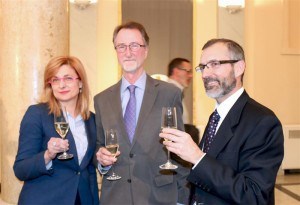 The declaration was witnessed by mayors Boris Mileti? (Pula), Ivan Vrki? (Osijek), Andro Vlahuši? (Dubrovnik) and Vojko Obersnel (Rijeka) and, in addition to Ana Lederer, PhD, deputy minister of culture, Predrag Šustar, minister of science, education and sport, Iva Hraste So?o, PhD, assistant of the minister of culture, Davor Trupkovi?, assistant of the minister of culture, His Excellency Timothy Harrington, ambassador of Ireland in the Republic of Croatia and Vesna Kusin, deputy mayor of Zagreb, together with many other figures from the Croatian world of politics and culture, were also present.
The declaration was witnessed by mayors Boris Mileti? (Pula), Ivan Vrki? (Osijek), Andro Vlahuši? (Dubrovnik) and Vojko Obersnel (Rijeka) and, in addition to Ana Lederer, PhD, deputy minister of culture, Predrag Šustar, minister of science, education and sport, Iva Hraste So?o, PhD, assistant of the minister of culture, Davor Trupkovi?, assistant of the minister of culture, His Excellency Timothy Harrington, ambassador of Ireland in the Republic of Croatia and Vesna Kusin, deputy mayor of Zagreb, together with many other figures from the Croatian world of politics and culture, were also present.
[foogallery id=”4070″]
Source: Ministry of Culture of the Republic of Croatia / HINA
 Steve Green, the president of the Commission of independent experts for the election of the Croatian European Capital of Culture 2020 from the European Commission, said that this decision was ?not rooted in heritage or history, but in plans for the future life of the city?. He stressed that Rijeka, like the other cities that entered the second round of the competition, met all the set criteria, but that the Commission’s evaluation of the proposed programmes was not based only on the programmes that these cities prepared for 2020, but also on all the things they are planning to realise in the years after they become European Capital of Culture.
Steve Green, the president of the Commission of independent experts for the election of the Croatian European Capital of Culture 2020 from the European Commission, said that this decision was ?not rooted in heritage or history, but in plans for the future life of the city?. He stressed that Rijeka, like the other cities that entered the second round of the competition, met all the set criteria, but that the Commission’s evaluation of the proposed programmes was not based only on the programmes that these cities prepared for 2020, but also on all the things they are planning to realise in the years after they become European Capital of Culture. Steve Green expressed particular gratitude to the employees of the Croatian Ministry of Culture for their great dedication and professional approach to work and cooperation on the project, and congratulated the cities that entered the second round of competition, while stressing that ?all four cities worked hard to reach this point and, although it may appear as merely the effort of four teams, hundreds of people were involved in this work, including state officials, and this represented the key to success in all four cases?. The Commission reached their final decision on which of these cities could best relay the message of European solidarity after a final two-day presentation held in Zagreb on Wednesday and Thursday, at which the cities had the opportunity to individually appear before the Commission and hold a 45-minute presentation.
Steve Green expressed particular gratitude to the employees of the Croatian Ministry of Culture for their great dedication and professional approach to work and cooperation on the project, and congratulated the cities that entered the second round of competition, while stressing that ?all four cities worked hard to reach this point and, although it may appear as merely the effort of four teams, hundreds of people were involved in this work, including state officials, and this represented the key to success in all four cases?. The Commission reached their final decision on which of these cities could best relay the message of European solidarity after a final two-day presentation held in Zagreb on Wednesday and Thursday, at which the cities had the opportunity to individually appear before the Commission and hold a 45-minute presentation. Michel Magnier, director of Culture and Creativity, also welcomed Croatia to the ?big family of European Capitals of Culture?, reminding that this initiative, which was established 30 years ago, has today developed into one of the most prominent cultural events in Europe that focuses on the promotion of intercultural dialogue and mutual understanding.
Michel Magnier, director of Culture and Creativity, also welcomed Croatia to the ?big family of European Capitals of Culture?, reminding that this initiative, which was established 30 years ago, has today developed into one of the most prominent cultural events in Europe that focuses on the promotion of intercultural dialogue and mutual understanding. Ana Lederer, PhD, deputy minister of culture, addressed the audience in the name of the Ministry of Culture of the Republic of Croatia and congratulated all of the cities competing for the title of European Capital of Culture, particularly those that entered the second round of the competition – Dubrovnik, Osijek, Pula and Rijeka. The deputy minister of culture emphasised that ?Croatian cities recognise culture as a catalyst for changes and long-term investment into the betterment of society as a whole. They have realised the strength and power of creative processes, not only when it comes the local community, but also society in its entirety?.
Ana Lederer, PhD, deputy minister of culture, addressed the audience in the name of the Ministry of Culture of the Republic of Croatia and congratulated all of the cities competing for the title of European Capital of Culture, particularly those that entered the second round of the competition – Dubrovnik, Osijek, Pula and Rijeka. The deputy minister of culture emphasised that ?Croatian cities recognise culture as a catalyst for changes and long-term investment into the betterment of society as a whole. They have realised the strength and power of creative processes, not only when it comes the local community, but also society in its entirety?. The declaration was witnessed by mayors Boris Mileti? (Pula), Ivan Vrki? (Osijek), Andro Vlahuši? (Dubrovnik) and Vojko Obersnel (Rijeka) and, in addition to Ana Lederer, PhD, deputy minister of culture, Predrag Šustar, minister of science, education and sport, Iva Hraste So?o, PhD, assistant of the minister of culture, Davor Trupkovi?, assistant of the minister of culture, His Excellency Timothy Harrington, ambassador of Ireland in the Republic of Croatia and Vesna Kusin, deputy mayor of Zagreb, together with many other figures from the Croatian world of politics and culture, were also present.
The declaration was witnessed by mayors Boris Mileti? (Pula), Ivan Vrki? (Osijek), Andro Vlahuši? (Dubrovnik) and Vojko Obersnel (Rijeka) and, in addition to Ana Lederer, PhD, deputy minister of culture, Predrag Šustar, minister of science, education and sport, Iva Hraste So?o, PhD, assistant of the minister of culture, Davor Trupkovi?, assistant of the minister of culture, His Excellency Timothy Harrington, ambassador of Ireland in the Republic of Croatia and Vesna Kusin, deputy mayor of Zagreb, together with many other figures from the Croatian world of politics and culture, were also present.